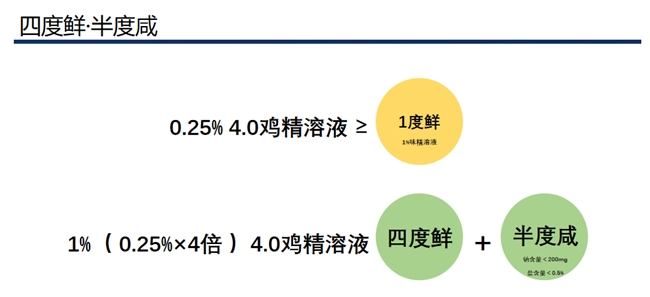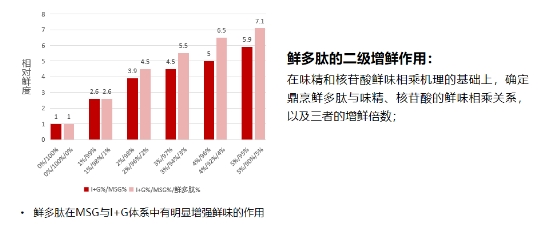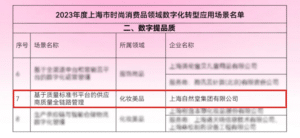The “Four Degrees of Freshness and Half Degree of Salty” Action to Help 1.4 Billion People Eat Healthier Seminar on Promoting Freshness and Reducing Salt and Sodium was held at Shanghai Dongjin Group

[ad_1]
In order to respond to the national call and implement the national nutrition and health action policies of the Central Committee and the State Council’s “Healthy China 2030” Planning Outline, “National Nutrition Plan (2017-2030)” and “Healthy China Action (2019-2030)”, Shanghai Through long-term scientific and technological exploration and continuous innovation, Dongjin Group has launched a small molecule fresh polypeptide compound seasoning that improves freshness and reduces salt and sodium. On April 11, Shanghai Dongjin Food Group Co., Ltd. held a seminar on “Four Degrees of Freshness and Half Degree of Saltiness” to improve freshness and reduce salt and sodium. At the meeting, Dongjin Group Chairman Guangrong Zhong delivered a keynote speech titled “Four Degrees of Fresh and Half Degree of Salty”.
Seminar site
Leaders of the China Food Industry Association, leaders of the Shanghai Municipal Health Commission, academicians of the Chinese Academy of Sciences, nutrition and health experts of the Chinese Academy of Sciences, experts from relevant medical schools, academies and industry experts gathered together to share the latest scientific research results and developments in the field of scientific research on freshness, salt and sodium reduction. trend, and provide suggestions and suggestions to further increase the attention of the whole society on reducing salt and improving freshness, and to improve the health level of the whole people.
“People put food first and taste first.” Edible salt, as the first of a hundred flavors, plays an important functional role in daily life and food processing. According to data published in the “Scientific Research Report on the Dietary Guidelines for Chinese Residents”, high salt intake has become the main dietary risk of death in China. The international authoritative journal “The Lancet” released that high-salt diet kills approximately 3 million people and leaves 70 million disabled. Therefore, to achieve universal health, salt reduction is an extremely important aspect. Today, half of the countries in the world have launched salt reduction actions. In the process of salt reduction in my country, most of the methods are to directly reduce the amount of salt added. This method is time-consuming, has low flavor perception and low pleasure in taste conversion and adaptation to slow food, and will also affect the processing characteristics, texture characteristics and preservatives of food. After nearly 40 years of hard work, people’s daily salt addition has gradually dropped from 5% to the current situation of “once salty, twice fresh”; however, it is still a very arduous and ambitious project to reduce it to the safe level of 0.5%. .
Therefore, combined with scientific and technological means, salt reduction intervention can be carried out while improving the pleasantness of food flavor to achieve the purpose of salt reduction.
At the seminar, the scientific research team of Dongjin Group focused on “the nutritional value of polypeptides and the secondary freshness-enhancing effect in compound seasonings, the calibration and tasting of four degrees of freshness and half degree of saltiness, and the differences with other products, and the application of 4.0 chicken essence on freshness Special speeches were given on three aspects: “The practical significance of the upgrading of the flavor industry”.
Zhang Guo, head of the technology center of Shanghai Dongjin Food Group, said that for forty years, Dongjin Group, under the leadership of Chairman Guang Zhong, has been engaged in the research and popularization of umami technology and umami science, using freshness to reduce salt. Effective progress has been made in reducing sodium, and the promotion action of “Four Degrees Fresh, Half Degree Salty” has been creatively proposed. Through the synergistic effect of the umami and salty taste of small molecule fresh polypeptides, through theoretical calculations, a large number of test evaluations and preliminary social practice, 1g of 4.0 chicken essence can be used to replace 1g of edible salt and 2g of MSG to achieve the ultimate goal of reducing salt and sodium, cost Small, easy to operate, easy to implement, more nutritious and healthier.

Four degrees fresh and half salty formula
Guo Yu, general manager of Dongjin Food Suzhou Food Co., Ltd., said when talking about the “nutritional value and secondary freshness-enhancing effect of fresh peptides” that umami peptides, as protein enzymatic hydrolysis products, have the advantages of being natural, safe, delicious, and nutritious. Enriching the variety of condiments plays a key role in promoting the upgrading of condiments. Through the analysis of the taste-producing substance components in “Ding Bo Xian Polypeptide”, it was found that the fresh polypeptide can significantly enhance the umami taste in the MSG and I+G systems. Appropriate use of umami peptides can achieve the effect of reducing salt without reducing saltiness.

The secondary freshness-enhancing effect of umami peptides
In his keynote speech on “Four Degrees of Freshness and Half Degree of Salty”, Chairman Rongrong Zhong said that currently in the household, food industry, processing industry, and cooking industry, the mainstream implementation standard is two degrees of freshness and one degree of saltyness. Taking the first degree of freshness as a reference (through experimental big data measurement, 4.0 chicken essence is consistent with the internationally recognized first degree of freshness reference material), which is equivalent to adding 10g of salt and 10g of MSG to 1000ml of soup and vegetarian dishes to form the current mainstream. accustomed taste. The proposal of “four degrees of freshness and half degree of salt” is equivalent to replacing 10g of salt and 10g of MSG with 10g of 4.0 chicken essence in 1000ml of soup and vegetarian dishes. This is in response to the call of the National Health Commission and the “Healthy China 2030” Planning Outline (hereinafter referred to as the “Planning Outline”), to implement the “9.3g to 5g” fresh food, salt and sodium reduction into practice. executable attempts.
It is mentioned in the planning outline that the development of food must be more delicious, more nutritious, safer and more convenient. Honor said that inspired by this standard, Dongjin Group has invested a lot of money in the research and development of “future food”, designed, managed and operated in accordance with international GMP standards, and integrated “future food” with international standards. “The products of Dongjin Group must be inspected in the most high-end and strictest places,” he said. “If 4.0 Chicken Essence is a product and a technology that drives an industry, then the emergence of “four degrees fresh, half salty” While driving the development of the industry, its extended social benefit is to allow people across China to advocate more delicious, nutritious and safer food, which is a matter of social significance.”
Zhao Guoping, an academician and researcher at the Chinese Academy of Sciences, said that “four degrees of freshness and half a degree of saltiness” to increase freshness and reduce salt and sodium is a good paradigm for the food industry to achieve the task of reducing sodium and ensure national health. Improving freshness and reducing salt and sodium are the general trends in China’s food development. From the perspective of industrial development, Dongjin Group’s proposal of “four degrees freshness and half salty” is to use technological innovation to promote innovation in the food industry, which is the development of new productivity. An innovative manifestation; from a social perspective, it is of great significance to the healthy development of the people; from the perspective of overall national development, it is a good starting point for China’s diet to finally be able to promote the development of the country’s domestic demand and go global. hand.
Zhao Guoping said that improving freshness and reducing salt and sodium requires efforts at many levels, including from the research level (including: basic research, translational research, and applied research), to finally becoming a product, all the way to market promotion. This is a common task for the whole society. , it requires the recognition of all sectors of society and the collective wisdom and efforts to complete this matter. In the development process of the past 40 years, Dongjin Group has always been committed to transformational research. After the product is formed, it conducts application research and finally launches the product. It has always been successful. This research paradigm reflects the feelings and sense of responsibility of Chinese entrepreneurs, and the scientific spirit is worthy of praise.

Take a group photo
[ad_2]
Source link







